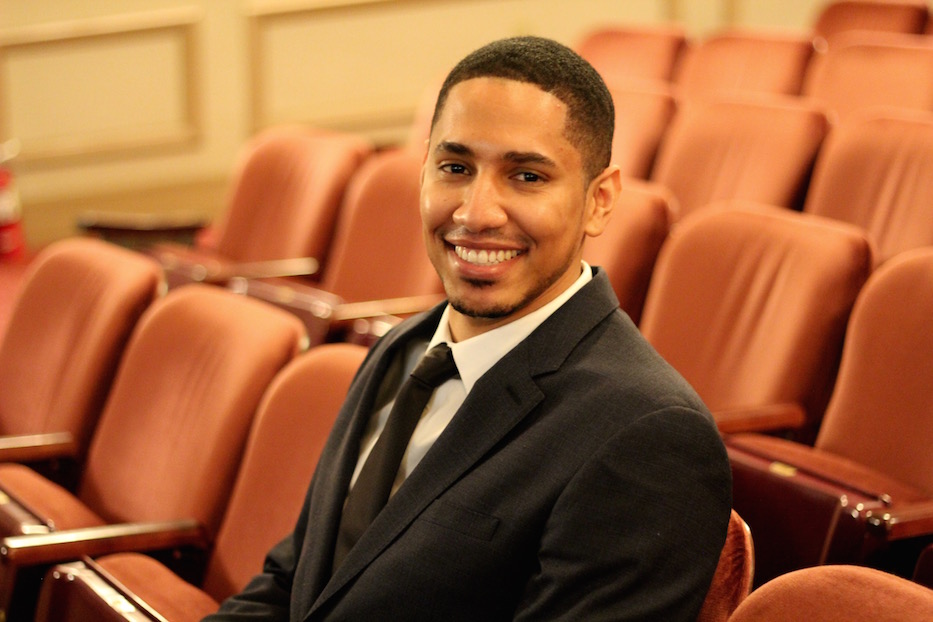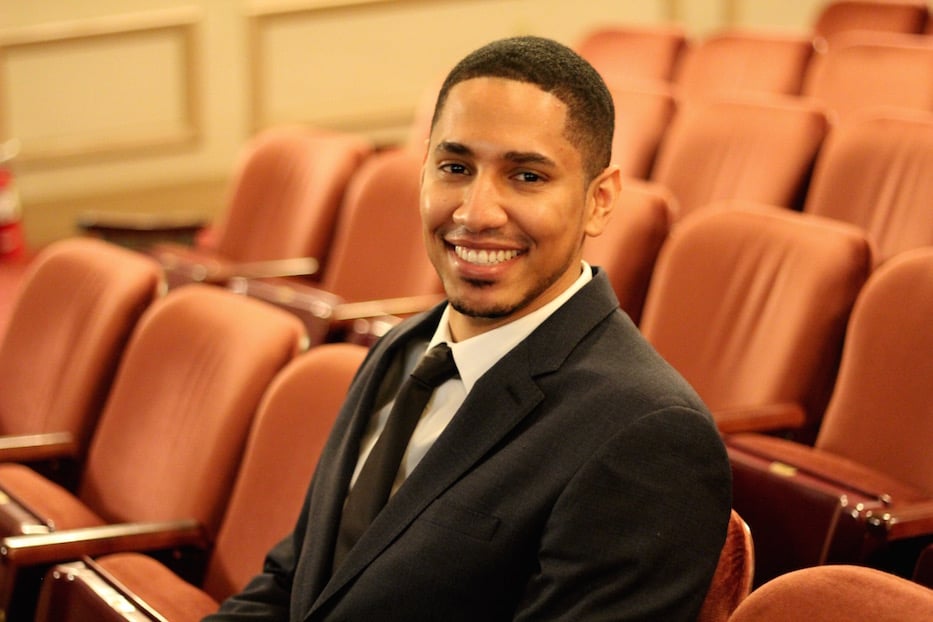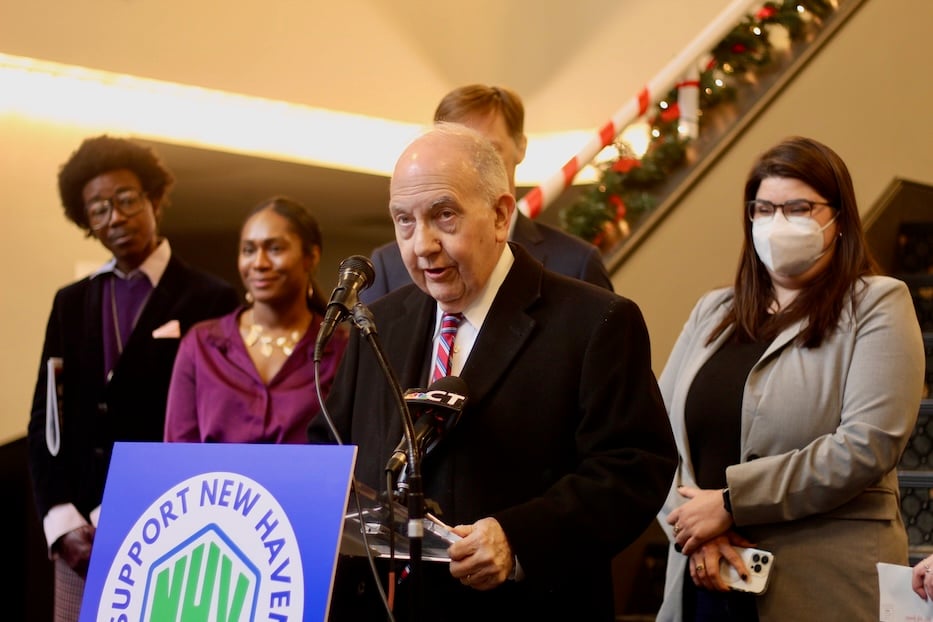
Downtown | Economic Development | Arts & Culture | Theater | Shubert Theatre

Anthony McDonald: Let's make sure the Shubert is here to stay. Lucy Gellman File Photo.
New speakers that will change how sound travels through the mezzanine, the balcony, and the box seats from the stage. Lighting that cuts cost, increases energy efficiency, and brings an old theater up to an industry standard. A 100-seat cabaret, buzzing with potential for intimate acts that have never considered performing in downtown New Haven. And at some point in there, repointing for the building to survive for another century on College Street.
All of those changes are coming to the Shubert Theatre next year, as the organization implements a $4,993,489 grant from the state's Community Investment Fund 2030 (CIF) in its 110th year in downtown New Haven. After scoring the grant through the third round of CIF funding earlier this year, Shubert staff and leadership have been working to map out a number of transformative changes to the space, from upgraded speakers to a lighting system that will get the theater through at least the next two decades.
"We have a lot of high hopes to be able to accomplish the things we need to do to bring this theater into the 21st Century," Executive Director Anthony McDonald, who joined the Shubert in March 2021, said in a phone call Tuesday afternoon. "There are things that we need to do to make sure that we're here to stay, and that our building isn't falling apart."
Starting next year, those renovations will all happen beneath the umbrella of "Shubert Sustainability Projects," a term McDonald associates with the theater's ability to receive long-overdue updates and survive as a College Street performing arts venue for another 100 years. Already, the Shubert has replaced speakers on the theater's orchestra and main levels, which amplify sound both in front of the stage and in the theater more broadly.
In the next several months, the Shubert will move ahead with replacing speakers in the mezzanine, the balcony, and the box seats. A set of hanging speakers in the space will also need to be replaced, McDonald said; their last upgrade came in 1996, when the technology was totally different.

Cooperative Arts & Humanities senior Khalil Antoine at a performance of SIX at the Shubert in September 2022. Lucy Gellman Photo.
That kind of change, while not always visible, can be transformative: touring productions often use the Shubert's sound system, but add speaker towers to the side of the stage that block patrons' sightlines. "We're trying to get away from that," said McDonald, aware that extra tech onstage can become a hindrance to enjoying a show.
While updates to the speaker system may come in the next months (McDonald did not have a hard-and-fast timeline), some of the larger improvements will likely have to wait until July 1 of next year, when the theater goes "dark" after a robust 2023-2024 season. That includes a total overhaul of the Shubert's current lighting infrastructure, which runs on a decades-old dimmer system, to cost-saving, energy-efficient LED lighting.
It’s been a long time coming. When the dimmer system was first installed in 1983, the Shubert had just reopened to the public under city ownership, following seven years of financial insolvency and a temporary closure. In the intervening four decades—during which, for perspective, McDonald was born, went to school, finished two advanced degrees, worked multiple jobs and became a parent himself—lighting technology has changed so much that some of the Shubert's current lighting equipment is both archaic and technically illegal.
With the grant funding, the theater is able to install both LED and intelligent or moving lighting, making it a more appealing venue for touring productions. During McDonald’s tenure, which has seen the theater reopen from Covid and widely expand its programming, that’s been one of his first priorities. "We’re beginning to up our level of spectacle and artistry," he said. "That’s another world where if you come, we want to make sure that you get the full experience."

State Sen. Martin Looney championing the grant in the lobby of the Shubert earlier this month. Lucy Gellman File Photo.
He added that lighting doesn't just bring the Shubert back up to code, but also helps the theater keep costs down on one item when it feels like the price of everything else has continued to rise. Some of the old lighting, for instance, might run between 750 and 3000 watts—using significantly more energy than a 200 or 500-watt LED light that patrons can look forward to when they return in the fall.
LED lights also have staying power: they are good for around 20,000 hours of use, and generate less heat when they are on. That means lower heating and cooling bills for the theater, as well as a system that enables a higher production value for performing artists and shows in the space. Whether it's a touring production of SIX or New Haven Ballet's The Nutcracker, McDonald said, that makes a difference.
"All of our community partners, they get to also experience something different," he said. "They can continue to dream bigger and differently. The innovation for them will also hopefully increase as we raise the bar."
The final large renovation, and perhaps the most exciting for the Shubert, is the creation of a new, 100-seat cabaret style theater in what is currently the mezzanine lobby. For years—even before McDonald's tenure—there were efforts from the Shubert to get such a theater downtown, as a space that could provide more flexibility for smaller performances and gigs that may not yet have the name recognition to seat over 1,000 people (the main theater seats 1,664) but can bring people into downtown and spur economic growth in New Haven.
For McDonald, it opens up new opportunities for not only community partners, but also smaller, up-and-coming acts that are looking for more intimate venues in New Haven.
"We're hoping to create more access while also exploring other forms of entertainment," he said. For instance, he's inspired by New Haven's long and storied history of jazz, and has already been thinking about artists who could book a few shows in the space. Looking back on his time in Washington, D.C., he also fondly recalled open mic nights at Busboys & Poets, during which the venue would reserve its back room for a weekly night of poetry.
"It was just like an ambiance and a mood that I just don’t see anywhere else," he said. "It’s these kinds of atmospheres that we can create. Yes, they will keep people coming in, but they also create a new sense of possibility."
As renovations begin in the coming months, McDonald said he is extremely grateful to both city officials and members of New Haven's legislative delegation for their support. Before receiving the grant in late October, the Shubert had applied for two rounds of funding unsuccessfully; McDonald described the third try as "very much a team effort," with a push from both Mayor Justin Elicker and city economic development officials who made a strong case for why a performing arts institution deserved state support.
He added that the funding, while transformative, will only cover half of the work that the theater hopes to do in the next few years. With money left over from an Urban Act Grant from the state, the Shubert will be able to do repointing for the entire building, but will need to wait on further renovations to the lobby, HVAC systems, a backstage elevator and better live streaming capability in the space. McDonald said he is hopeful that additional funding will come through in the next years to make that a possibility.
Still, he said, he is feeling immense gratitude this holiday season, the first he will celebrate with a new daughter in tow. It's his hope, he said, that next year's renovations mean the Shubert will still be thriving on College Street by the time she gets to college.
"We really, greatly appreciated Senator Looney championing us," he said. "This will allow us to bring in bigger and better acts. It will also inevitably help our restaurant partners and businesses downtown. Helping us helps everyone around us. It’s the entire ecosystem."
In the past weeks, State Senate President Pro Tempore Martin Looney has also expressed excitement for the grant. Born and raised in New Haven, he's watched the Shubert navigate several artistic and economic transitions, including a brief period of closure in the 1970s and early 1980s, and struggle to stay afloat during the Covid-19 pandemic. For him, the coming updates are a vote of confidence in not just the theater, but also the economic future of downtown New Haven.
"It is a cultural icon," he said of the theater at a press conference at the Shubert earlier this month, noting the institution's cameo in the 1950 film All About Eve. "This is, of course, part of New Haven's heritage. We also have the Yale Repertory Theatre, the Long Wharf Theatre, theater is a part of New Haven ... and something that we need to maintain and continue."
“While people cite the dollar figures, the ancillary value, that arts and cultural programs bring in, I think we have to primarily cite the value of art in itself, whether it’s performance or representational art,” he said. “Art is something that ennobles the human spirit, and it should be talked about independently of financial aspects that it brings.”

